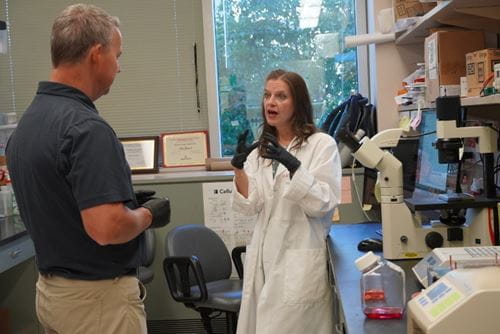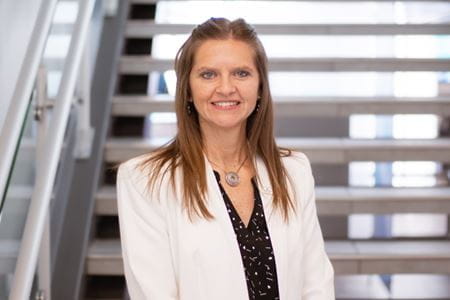The drive toward discovery
Fishel’s connection to cancer and the IU School of Medicine began much earlier than most of her colleagues. Her father was treated by the cancer center’s founding director Stephen Williams, MD, and Distinguished Professor Lawrence Einhorn, MD, IU’s first medical oncologist.
“I was a child, so I didn't completely understand everything that was going on,” Fishel remembered. “But after he passed away and I was growing up, I naively thought, ‘I’ll just make a drug that cures cancer.’”
Fortunately, Fishel’s high school had a strong science program, and she realized she had a natural aptitude for the subject, leading her to study chemistry at the University of Dayton. However, she quickly recognized she preferred studying molecular biology and applying that knowledge to tumor cell biology more than chemistry.
“I really liked understanding what drives the tumor to be a tumor and how we can make a drug that would stop or inhibit that activity,” she said.
After earning her bachelor’s degree, Fishel consulted with a mentor who recognized her potential and encouraged her to pursue a PhD. She embraced the challenge and returned to Indianapolis for graduate school at IU, where she studied under the mentorship of Mark Kelley, PhD. After earning her PhD, she attended the University of Chicago for her postdoctoral fellowship which provided her with experience in developing new combinations of chemotherapy.
After her postdoctoral training, Fishel rejoined the Kelley lab at IU as an assistant research professor and several years later was promoted to associate research professor. During this time, she secured significant grants from the National Institutes of Health (NIH) and built strong connections with peers in her field, all with the aim of leading her own lab, a milestone she achieved in 2019.
“The goal is not a title. The goal is to help someone who has cancer,” she divulged. “Remembering that goal is what inspired me during those moments when I wasn't sure if I was going to be able to get my own lab.”
The early stages of the Fishel lab coincided with the start of the COVID-19 pandemic, but despite the challenges, her determination allowed her to continue advancing her research. She published studies in peer-reviewed journals and secured additional funding, including NIH R01 and U01 grants, along with an award from the Department of Defense. These accomplishments culminated in her promotion to associate professor in 2024.
In addition to pancreatic cancer research, the Fishel lab also researches Malignant Peripheral Nerve Sheath Tumors, a rare and aggressive cancer that develops in the lining of nerves. This research focuses on identifying new treatment targets using tumor samples from pediatric patients.
 The power of collaboration and mentorship
The power of collaboration and mentorship Fishel's dedication to science drove her rise through the academic ranks, but she also recognized the important role her mentors and collaborators played in her journey. She formed a mentoring committee of fellow faculty members from the molecular oncology and experimental therapeutics research group at the Herman B Wells Center for Pediatric Research. She said her mentors are dedicated to nurturing junior faculty, and she credits the Wells Center for being a supportive environment from the very start.
“I've always loved being at the Wells Center, ever since I was a graduate student in the Kelley lab,” she said. “I feel it's very collaborative and I like that there are many different specialties here. Since I focus on pancreatic cancer, I think learning about areas like cardiology or diabetes and other specialties that influence the pancreas is all the better.”
While Fishel has been greatly influenced by her environment and mentors, she is equally dedicated to mentoring others. The Fishel lab often has trainees and students engaged in daily operations. Silpa Gampala, PhD, joined the lab as a postdoctoral fellow and is now an assistant research professor, becoming one of Fishel’s closest collaborators.
“She makes all of us working in the lab feel comfortable, especially with her communication style,” Gampala said. “She always encourages me to pursue opportunities like grant or award applications. She pushes us all in a way that is very constructive and productive.”
Being part of reputable research programs at IU has also helped grow Fishel’s national networks. She’s a principal investigator in the Pancreatic Cancer Stromal Reprogramming Consortium (PSRC), a multidisciplinary community of pancreatic cancer researchers with six sites across the country.
“Being part of the PSRC has provided a really good opportunity for networking and collaboration with some of the foremost leading pancreatic cancer researchers in the United States,” Fishel explained.
Fishel’s nationally recognized research in pancreatic cancer recently earned her an appointment as the Myles Brand Scholar in Cancer Research. This endowed chair honors Myles Brand, the 16th president of Indiana University and former NCAA president who passed away from pancreatic cancer in 2009. Brand made significant contributions to cancer research, advocacy in intercollegiate athletics and leadership in academia and sports.
“Myles Brand was a visionary,” she said. “I hope to honor his memory and his ‘why’ by bringing new and novel ideas to pancreatic cancer research.”
With her new appointment, Fishel aims to strengthen the pancreatic cancer research group she co-leads at IU by attracting talented investigators, providing new resources and fostering greater collaboration.
“Pancreatic cancer researchers at IU are a team. We're always going to be better together,” she said.
 Fueling the passion
Fueling the passion Fishel's journey has been guided by collaboration and strong mentorship, but when reflecting on the lessons she'd like to share with the next generation of scientists, she emphasizes the beauty of science and the experiences that first drew her to the field.
“Even if a basic finding doesn’t feel monumental, discovering something that could spur someone else to have an idea that leads to a cure or therapy is all a piece of the puzzle,” she advised. “I try to remind myself to not forget the wonder of what we do.”
Fishel also stays motivated by staying connected with the community that supports her work and the efforts of fellow Wells Center investigators, all dedicated to advancing pediatric research. She has spoken at several Riley Dance Marathons and often gives lab tours to Dance Marathon student groups and Riley Children’s Foundation donors. Engaging with people and showing them the work happening in the lab "reignites the fire," she expressed.
Fishel additionally credits her family — her husband and two children — for making her journey in cancer research deeply rewarding through their unwavering support.
“I have an amazing husband, and my children are incredibly proud of me, which is a wonderful feeling. They’re my biggest cheerleaders,” Fishel shared. “I was able to be the mom that I wanted to be and the scientist I wanted to be most of the time because they were understanding and saw the importance of my career.”
Fishel’s dedication to family extends to her lab, where she encourages her team to prioritize work-life balance and leads by example.
“She’s a role model,” said Gampala, reflecting on Fishel’s ability to balance work and personal commitments. “Watching her connect with her kids while mentoring us in the lab and taking on significant leadership responsibilities gave me hope that, yes, I can do this too.”
While Fishel’s journey in cancer research has been shaped by the support of mentors, colleagues and family, her personal connection to cancer remains her deepest source of motivation. She has experienced profound losses to the disease. In addition to her father, her college roommate, a close friend during her postdoctoral training in Chicago and her best friend’s father also passed away from cancer throughout her life. These experiences continue to fuel her passion for creating meaningful change through science.
“Everybody's life has been touched by cancer, but some pretty key people in my life have been taken. I don't want anybody else to lose their college roommate or their dad. I don't want anybody to lose their child,” Fishel said. “That’s my motivation.”
